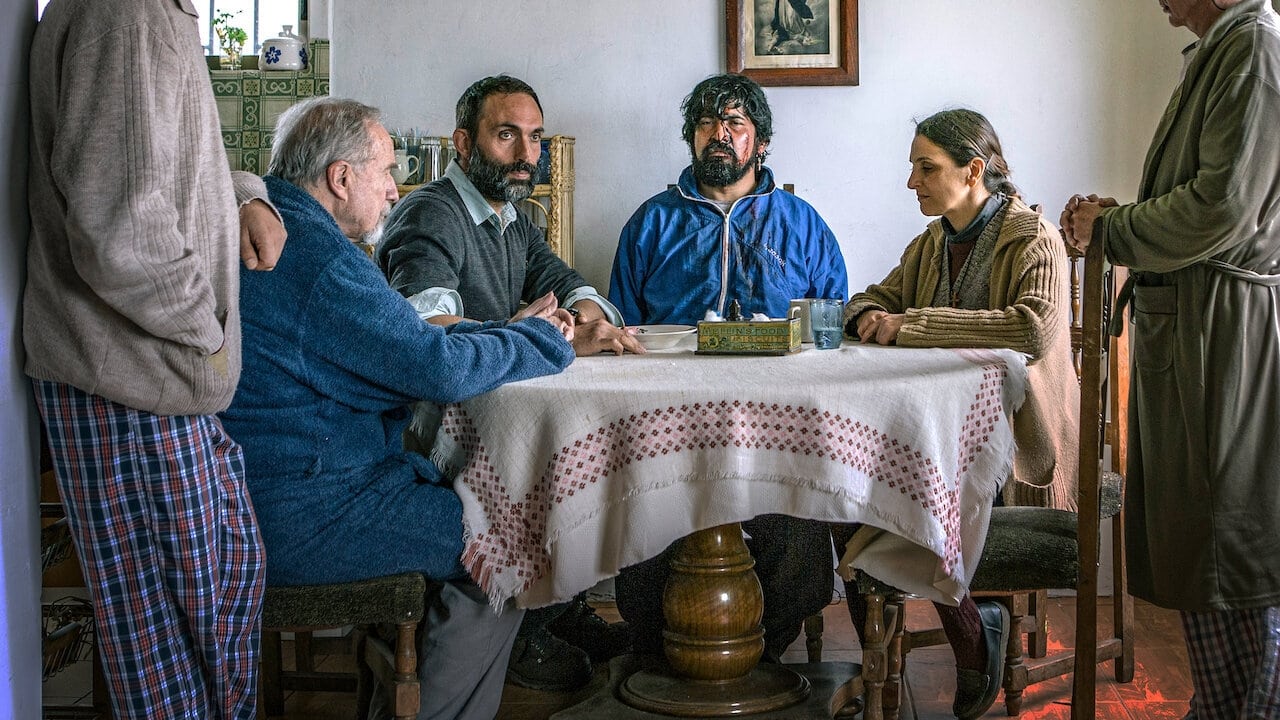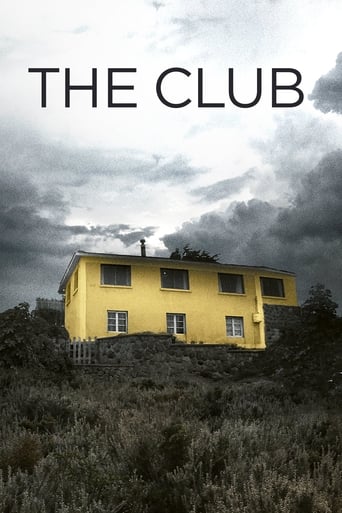



brilliant actors, brilliant editing
Bad Acting and worse Bad Screenplay
Clever and entertaining enough to recommend even to members of the 1%
View MoreThe film never slows down or bores, plunging from one harrowing sequence to the next.
View More"El Club" had a few main themes, those being religion, irony, secrets and guilt. A lot of viewers have actually said that this film was made to expose the Catholic church and make it look bad. I agree with this statement, because so many events that happened in it were ironic, because there were things done and said by priests (whom this movie focused on) that would not typically qualify as 'holy' in my opinion. El Club is about four old, retired (and at least one gay) Catholic priests living in a house, ("the club") in a secluded, beachy and foggy area in Chile. The house is run by a woman surprisingly, whom is a retired nun, making up all the rules, one being that there was no contact with the outside world unless they were in their circle of religious figures. The group loves racing dogs, which seems to be a shared passion for all of them, (which I thought was a bit strange and random.) They have a strict schedule that forces free time to mold around their duties of praying. However, the reason this house is secluded is because the men are secretly there to ask God to forgive them for their sins, which are actually horrible crimes. These priests are guilty of child molestation, abuse, kidnapping, etc. Early in the movie, a new priest comes into the house, but his sins follow him. A now grown man stands outside the house yelling about the very graphic and horrendous sex abuse he endured as an altar boy from this new priest. However, the priest cannot seemingly stand his guilt, and quickly shoots himself in front of everybody. This is when I realized that this movie is extremely messed up, because later when the police were questioning the others in the house about why he was dead, the nun and other priests lied to cover up the abuse and crimes he had committed. When a new director comes in he sees the dysfunction, and wants to shut down the home. This film then follows the journey of their dog racing, trying to save the home, and the life of the angry man who was abused sexually by the dead priest. I liked this film, but I liked it less and less as it progressed. I found the point of the ending very confusing and it honestly lost me. This was possibly because there was very little dialogue between characters, and when there was, it was short. It ended with men killing the race dogs, blaming it on the man whom was abused and then him being ironically brought to repent his 'sins' in the house with the other four priests. I really loved the beginning, however, and my favorite scene was when the man was outside the home screaming the sex abuse he endured to his molester. I found this very interesting, because not only were the poor man's words very graphic and "unholy" but, as he was yelling them, the priest (his molester) was denying it to his housemates. I thought that when he grabbed the gun he was going to shoot the man yelling outside the house, but actually shot himself, which I was not expecting. I also liked when the nun was cleaning up his blood, she was singing very peaceful church songs. This film was very bizarre, weird and sexual, which I found ironic. I wish that the director had left out the theme of the dog racing because it just confused me and made the main theme of secrecy between priests less prominent and blurry.
View MoreSadly, this is the most boring film I have seen in the last 12 months. I have enjoyed many films what others called the worst film of the year. That means I love to take chances, but I was surprised for this which is the least liked by me from the year 2015.I usually respect films and filmmaking, so I thought to skip reviewing it than writing negatives about it, but then I thought I hadn't written much for the disliked films. Realised I should not go like this being neutral, because I collect my reviews and I wanted all kinds like good, bad, average for my basket.I never considered myself an atheist or a theist, just a form of a life on the planet earth, so it's nothing to do with the religion for my viewpoint on this. This drama about the corrupted priests was not like I expected, I kind liked the theme, but not the overall film.It was sent to represent Chile in the recently concluded Oscars, which was a similar theme to the top award winner 'Spotlight' but failed to qualify for the main event. If it was based on the real then my reaction would have been different.They have tried it with a dark comedy that I was not impressed with the overall presentation. But there were a very few good scenes and it was not enough to win me. I know the majority of those who had watched the film are saying many good stuffs about it, looks like I might be the lone black spot around here that deserves dislike votes, so come guys!! Do it!3/10
View MorePablo Larraín's "El club" (2015) is a well-made film, but in the end it seems like a crowd pleaser for culture-freak cinéphiles. Not only did I find the subject a little trite (effects of sexual abuse of boys by priests) and gruesome, for all the situations that I witnessed that were truer, and sometimes as excessive and pathetic as the case shown here, during the 12 years I spent in a school ruled by Augustinian Recollects; but I also found there is a lack of compassion in its treatment of behaviors and the story, and a bit sensationalism and rudeness without necessity, when in cases like this of all sexual orientations, the most adequate keyword seems to be compassion. But in the end everybody has the right to make personal interpretations of such matters, although I still insist that there are too many stereotyped traits in the exposition of the victim and the victimizers. I do not know if what we see are consequences of Augusto Pinochet's dictatorial regime, but there is something crudely realistic, in morbid and sordid ways, in the characters and situations of the four films by Larraín that I have seen, in which we do not perceive the (also clichéd, if you will) joy of living that we all need to go on. And it's one film after the other, in which -- in spite of the masterful execution-- when they end, one would rather be dead and gone!
View MorePablo Larrain (No) returns with another story that shadows his country with 'The Club'. Before the details emerge, this story is nothing like 'No'.'The Club' takes place in the somewhat remote coastal village of La Boca Navidad where a house of secret guests exists: they are either child molesters, baby snatchers, or were active supporters of Pinochet, and they were all Priests. They have all been excommunicated from the Catholic Church for their crimes and sent away to this house as not to harm the Church's image instead of being put in the public eye and then thrown in jail. The house is quarterbacked by a Nun who also suffered a similar fate as her house guests.One day, a new guest comes to join The Club, only to be eventually tracked down by a former altar boy who shouted claims of constant abuse from outside the house for him to hear. Not long after, we learn that these claims are true, and the reaction sets off a further investigation into the requirement for the house and the livelihood of the guests who reside there.'The Club' isn't an artistic work that should be shared for praise and glorified for any kind of distinction. Instead, it clearly details the horrific nature of how the Catholic Church deals with their worst offenders — by putting them in houses in rural locations, 100% funded by the Church. As the film progresses, we learn that the house mates have ways of passing the time — good and bad. Some are healthy, while others are vices. Eventually, when the house comes under inspection by the Church as to whether it should remain or not, extreme actions are taken to try and keep things intact.While advertised as a dark comedy, this film is almost nowhere near that. It was intended to show the evil behind the Church, and that its image cannot be tarnished. In a continent that houses 40% of the world's Catholics, a film like this definitely sticks a thorn in the Church's side. It gets dark, it gets rather nasty, it gets brutal, but, while it's just a story with fictional accounts, they were created via true stories over the years.Watch this film with the expectation that you will be shocked by what you see and hear, but hopefully you will be moved enough to know that there's evil where good supposedly resides.
View More